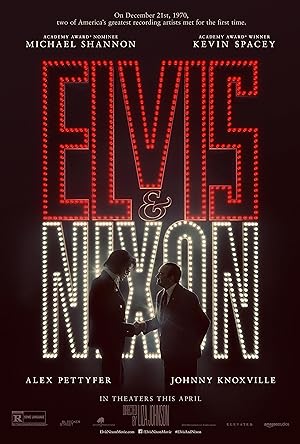I have zero interest in Elvis or Nixon other than from a historical perspective, but if Michael Shannon is playing Elvis, I’m there. Elvis & Nixon was a delightful movie with a bittersweet undercurrent throughout the innately enjoyable and comically absurd true story. I would happily rewatch Elvis & Nixon if time would permit.
Elvis & Nixon starts with Elvis alone and frustrated with the state of the nation as depicted on his TV. He leaves his estate, and shenanigans ensue as the superstar tries to accomplish ordinary tasks, but is unable to do so without creating a stir. He rounds up a childhood friend and former part of his entourage for his latest mission: to become a Federal Agent and get a badge. He wants to go undercover and join the fight against drugs. His childhood friend is torn between his friendship and his desire to create an independent life for himself. Meanwhile Nixon’s Deputy Assistant Chapin played by X-Men’s Quicksilver and another official played by Colin Hanks are eager to get Nixon meet Elvis. After some unsuccessful attempts, Elvis finally gets an audience with President Nixon played by Kevin Spacey, and everyone gets what they want for now.
I have never seen Michael Shannon seem to have so much fun as his interpretation of Elvis, and his depiction helped me understand Elvis as a cultural phenomenon. Shannon’s Elvis knows what is appropriate and what isn’t. He does not care, and he wields his fame like a magical tool to make things happen. He even manages to charm Nixon, who is initially dismissive and disdainful of the superstar, and have free reign over the White House. Shannon communicates a lot with just a “hmmm” and his physical demeanor. Elvis wanting a badge is infantile, but for him, it is a symbol that his persona can still get him access to seats of power and is an act of self-preservation against the impending wave of obscurity promised by the popularity of the Beatles.
When he isn’t brandishing his persona, Shannon expresses dismay at how he has become a caricature of himself. Shannon’s Elvis knows that he is absurd and is disgusted by the overtop performance of himself, but it is his only power. Unfortunately he is losing himself in the process and feels like less of a man.
There is a strange theme repeated in Elvis & Nixon. Elvis & Nixon depicts Elvis as constantly seeking out black people and occupying black spaces either intentionally or unintentionally. He notices the black people who work in his hotel. They are visible to him in a way that those who adore him are not—he usually disregards them the moment they are not useful. He is just an ordinary guy to the black people depicted in Elvis & Nixon (not including his driver) even though they know who he is. Please note that he does not wish to engage with them as he does with his childhood friend as equals or as an admirer. He displays a different type of power struggle by displaying a formerly concealed gun in a donut shop in a black neighborhood. He plays the role of the dominant overseer who has access to all spaces even if he actually feels insecure and out of place as he is confronted for his appropriation. If his fame can’t get him more power to assuage his waning popularity, he will use other familiar roles available to Southern white men.
Side note: who did the hair on Elvis & Nixon? That person deserves an Academy Award because I could not tell that Michael Shannon was wearing a wig, if he was, when he was combing his hair.
Elvis & Nixon is a delightful meditation on identity, power and fame. I would highly recommend it to anyone.
Stay In The Know
Join my mailing list to get updates about recent reviews, upcoming speaking engagements, and film news.





